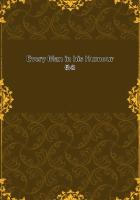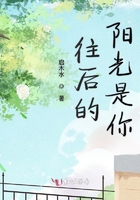"Does it ever seem to you, Terence, that the world is composed entirely of vast blocks of matter, and that we're nothing but patches of light--" she looked at the soft spots of sun wavering over the carpet and up the wall--"like that?"
"No," said Terence, "I feel solid; immensely solid; the legs of my chair might be rooted in the bowels of the earth. But at Cambridge, I can remember, there were times when one fell into ridiculous states of semi-coma about five o'clock in the morning. Hirst does now, I expect--oh, no, Hirst wouldn't."
Rachel continued, "The day your note came, asking us to go on the picnic, I was sitting where you're sitting now, thinking that;
I wonder if I could think that again? I wonder if the world's changed? and if so, when it'll stop changing, and which is the real world?"
"When I first saw you," he began, "I thought you were like a creature who'd lived all its life among pearls and old bones.
Your hands were wet, d'you remember, and you never said a word until I gave you a bit of bread, and then you said, 'Human Beings!'"
"And I thought you--a prig," she recollected. "No; that's not quite it.
There were the ants who stole the tongue, and I thought you and St. John were like those ants--very big, very ugly, very energetic, with all your virtues on your backs. However, when I talked to you I liked you--"
"You fell in love with me," he corrected her. "You were in love with me all the time, only you didn't know it."
"No, I never fell in love with you," she asserted.
"Rachel--what a lie--didn't you sit here looking at my window-- didn't you wander about the hotel like an owl in the sun--?"
"No," she repeated, "I never fell in love, if falling in love is what people say it is, and it's the world that tells the lies and I tell the truth. Oh, what lies--what lies!"
She crumpled together a handful of letters from Evelyn M., from Mr. Pepper, from Mrs. Thornbury and Miss Allan, and Susan Warrington.
It was strange, considering how very different these people were, that they used almost the same sentences when they wrote to congratulate her upon her engagement.
That any one of these people had ever felt what she felt, or could ever feel it, or had even the right to pretend for a single second that they were capable of feeling it, appalled her much as the church service had done, much as the face of the hospital nurse had done; and if they didn't feel a thing why did they go and pretend to?
The simplicity and arrogance and hardness of her youth, now concentrated into a single spark as it was by her love of him, puzzled Terence; being engaged had not that effect on him; the world was different, but not in that way; he still wanted the things he had always wanted, and in particular he wanted the companionship of other people more than ever perhaps. He took the letters out of her hand, and protested:
"Of course they're absurd, Rachel; of course they say things just because other people say them, but even so, what a nice woman Miss Allan is; you can't deny that; and Mrs. Thornbury too; she's got too many children I grant you, but if half-a-dozen of them had gone to the bad instead of rising infallibly to the tops of their trees-- hasn't she a kind of beauty--of elemental simplicity as Flushing would say? Isn't she rather like a large old tree murmuring in the moonlight, or a river going on and on and on? By the way, Ralph's been made governor of the Carroway Islands--the youngest governor in the service; very good, isn't it?"
But Rachel was at present unable to conceive that the vast majority of the affairs of the world went on unconnected by a single thread with her own destiny.
"I won't have eleven children," she asserted; "I won't have the eyes of an old woman. She looks at one up and down, up and down, as if one were a horse."
"We must have a son and we must have a daughter," said Terence, putting down the letters, "because, let alone the inestimable advantage of being our children, they'd be so well brought up."
They went on to sketch an outline of the ideal education-- how their daughter should be required from infancy to gaze at a large square of cardboard painted blue, to suggest thoughts of infinity, for women were grown too practical; and their son--he should be taught to laugh at great men, that is, at distinguished successful men, at men who wore ribands and rose to the tops of their trees.
He should in no way resemble (Rachel added) St. John Hirst.
At this Terence professed the greatest admiration for St. John Hirst.
Dwelling upon his good qualities he became seriously convinced of them; he had a mind like a torpedo, he declared, aimed at falsehood.
Where should we all be without him and his like? Choked in weeds;
Christians, bigots,--why, Rachel herself, would be a slave with a fan to sing songs to men when they felt drowsy.
"But you'll never see it!" he exclaimed; "because with all your virtues you don't, and you never will, care with every fibre of your being for the pursuit of truth! You've no respect for facts, Rachel; you're essentially feminine." She did not trouble to deny it, nor did she think good to produce the one unanswerable argument against the merits which Terence admired. St. John Hirst said that she was in love with him; she would never forgive that; but the argument was not one to appeal to a man.
"But I like him," she said, and she thought to herself that she also pitied him, as one pities those unfortunate people who are outside the warm mysterious globe full of changes and miracles in which we ourselves move about; she thought that it must be very dull to be St. John Hirst.
She summed up what she felt about him by saying that she would not kiss him supposing he wished it, which was not likely.
As if some apology were due to Hirst for the kiss which she then bestowed upon him, Terence protested:
"And compared with Hirst I'm a perfect Zany."
The clock here struck twelve instead of eleven.
"We're wasting the morning--I ought to be writing my book, and you ought to be answering these."
"We've only got twenty-one whole mornings left," said Rachel.















